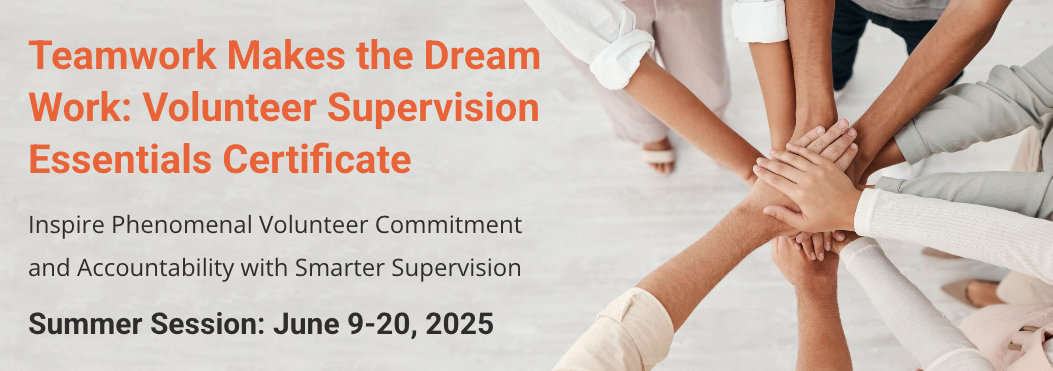Nonprofit Leadership and Volunteers: Skills, Competencies and Models
Now, more than ever, volunteer administrators are called upon to strengthen their nonprofit leadership skills.
The ability to inspire and influence is critical to a volunteer coordinator’s success on the job. Whether they work with volunteers, community partners, executive management, or colleagues, a coordinator must have skills in place that will inspire action.
The typical information and training you will find for nonprofit leadership often focus on helping executive leaders and board chairs gain traction.
However, leaders of volunteers can also benefit from strengthening their nonprofit leadership competencies.
After all, their work to engage volunteers affects the entire organization and its ability to meet its mission. In addition, volunteer managers are often the face of the organization as they outreach into the community to engage supporters.
What leaders of volunteers need are actionable steps they can take to strengthen their nonprofit leadership skills.
Wondering what nonprofit leadership looks like for those who lead volunteers? Check out “What Every Volunteer Manager Needs to Know: A Lesson in Leadership” HERE >>
Nonprofit Leadership: What it Takes to Manage a Successful Volunteer Program
In the past, volunteer-driven organizations were able to rely on volunteers to commit to consistent, limitless years of service.
Unfortunately, this just isn’t true anymore.
With a global pandemic, changing demographics, and a public that is more discerning about how it spends its time, maintaining sustainability over the long-term means that we must rethink how we use volunteer talents, how we reconfigure their work, how we collaborate within our team and how we share leadership at all levels to ensure the most effective use of volunteers.
By offering compelling volunteer projects, a variety of assignments within which volunteers can apply their own skills, and a solid foundation of staff support, agencies can offer current and prospective volunteer opportunities that are relevant, appealing, and manageable.
This all requires strong nonprofit leadership and management skills.
Below is the Council for Certification in Volunteer Administration (CCVA) “Body of Knowledge and Competency Framework,” which represents core competencies that support effective volunteer program administration practices, developed by subject matter experts in the field.
According to the CCVA, five core competencies serve as a foundation for the profession of volunteer administration, regardless of where or how it is practiced:
1) Ethics: The ability to act in accordance with professional principles.
2) Organizational Management: The ability to design and implement policies, processes, and structures to align volunteer involvement with the mission and vision of the organization.
3) Human Resource Management: The ability to successfully engage, train and support volunteers in a systematic and intentional way.
4) Accountability: The ability to collect relevant data and engage in meaningful monitoring, evaluation, and reporting to stakeholders.
5) Leadership and Advocacy: The ability to advance individual, organizational, and community goals by advocating for effective volunteer involvement inside of the organization and in the broader community it serves, through the investment of personal integrity, skills, and attitudes.
An investment in staff time and organizational infrastructure is required to build and sustain robust volunteer involvement.
Success does not happen by accident.
The inclusion of volunteers in both leadership (as well as support) positions can also help expand what a paid staff person can do alone.
Great Nonprofit Leadership Can Make All the Difference
Fortunately, there is plenty of evidence about what makes a good leader, and research shows that leadership across the private, public, and nonprofit sectors don’t differ that much.
In their influential book, The Leadership Challenge: How to Make Extraordinary Things Happen in Organizations, James Kouzes & Barry Posner offer a well-researched model for five practices and ten commitments of exemplary leadership.
Their findings show leaders who exhibited these traits were able to bring about notable changes in their organizations through inspirational leadership.
They discovered that leadership wasn’t just a nice, feel-good concept.
Leadership, when exercised with value-driven commitment, makes a positive difference.
Below are some of the concrete ways better leadership made an impact across a wide variety of contexts. Most noteworthy, they are also often-cited challenges volunteer managers work hard to overcome.
- Created higher-performing teams
- Fostered loyalty and greater commitment
- Increased fundraising results and gift levels
- Increased retention and reduced turnover
- Positively influenced recruitment
Nonprofit Leadership: An Evidence-Based Model with Steps for Volunteer Managers
Below are Kouzes and Posner’s five practices and ten commitments that promise improved performance and more impactful results.
This model is highly useful in the nonprofit realm, and I’ve suggested some ways they might be adapted for practical use in volunteer leadership.
These are also excellent ways to deepen trust and create a culture of belonging for volunteers from all walks of life.
Model the Way
- Clarify values by finding your voice & affirming shared values
- Action Item for Volunteer Managers: Develop a Philosophy of Volunteer Engagement that describes how and why volunteers are involved and share it with management and staff
- Set the example by aligning actions with shared values
- Action Item for Volunteer Managers: Walk the talk by working alongside volunteers from time to time, to better understand their experiences and needs
Inspire a Shared Vision
- Envision the future by imagining exciting and ennobling possibilities
- Action Item for Volunteer Managers: Imagine and describe the ways volunteers can lead versus follow at your organization
- Enlist others in a common vision by appealing to shared aspirations
- Action Item for Volunteer Managers: Involve volunteers in their future with the organization, and brainstorm with them new and exciting ways they can volunteer
Challenge the Process
- Search for opportunities by seizing the initiative and looking outward for innovative ways to improve
- Action Item for Volunteer Managers: Seek out cross-disciplinary and cross-sector collaborations (with business, academia, etc.) to unearth new discoveries and approaches
- Experiment and take risks by constantly generating small wins and learning from experience
- Action Item for Volunteer Managers: Test innovative ideas and work towards improvement by guiding volunteers through developing small, self-reflective “growth pilot projects”
Enable Others to Act
- Foster collaboration by building trust and facilitating relationships
- Action Item for Volunteer Managers: Actively aid volunteers in developing deep-rooted relationships by infusing trust- and teambuilding activities in meetings and training
- Strengthen others by increasing self-determination and developing competence
- Action Item for Volunteer Coordinators: Develop a leadership pathway and training that volunteers can use to develop their leadership skills and assume greater responsibility
Encourage the Heart
- Recognize contributions by showing appreciation for individual excellence
- Action Item for Volunteer Managers: On a regular basis, recognize individual volunteers for personal improvements and successes, both in partnership with the organization and outside it
- Celebrate the values and victories by creating a spirit of community
- Action Item for Volunteer Managers: Share and archive photographs and stories that document the “living history” of volunteer achievements at your organization
What Do You Think?
Does Kouzes and Posner’s model make sense for nonprofit and civic leaders?
Which nonprofit leadership skills are missing that relate to volunteer managers that you would add to this list?
Are there other leadership models that work well in our context?
For more on this important topic, check out “Nonprofit Leadership and Management: How to Modernize Now” HERE >>









